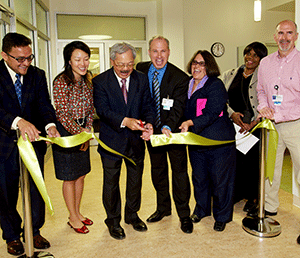 A San Francisco health clinic that provides care to some of the city’s poorest residents, including transgender patients and people living with HIV, recently marked some upgrades in services and its physical space.
A San Francisco health clinic that provides care to some of the city’s poorest residents, including transgender patients and people living with HIV, recently marked some upgrades in services and its physical space.
Primary care services from the Tom Waddell Health Center, named after the late physician and founder of the Gay Games, and the Housing and Urban Health Center have been combined, renamed, and moved into a new location at 230 Golden Gate Avenue. Mayor Ed Lee and others marked the grand opening at a ribbon cutting ceremony Wednesday, September 11.
L to R: Supervisor David Campos, Supervisor Jane Kim, Mayor Ed Lee, medical director Dr. Joseph Pace, Health Director Barbara Garcia, health department officials Marcellina Ogbu and Mark Alstead. (Photo: Jane Philomen Cleland)The new agency is the Tom Waddell Urban Health Clinic.
“The Tom Waddell staff has been a national leader in providing homeless/HIV and transgender primary care services for many years,” Health Director Barbara Garcia said in a statement. “We are proud to provide our clients with this beautiful, state-of-the-art facility and health clinic. Our patients deserve it and our committed employees deserve it.”
Dr. Joseph Pace is director of primary care homeless services for the Department of Public Health, which operates the clinic, and also serves as Tom Waddell’s medical director.
Pace called the new space “state-of-the-art,” and said the upgrade is meant to demonstrate the city and health department’s “commitment to providing high quality care to this vulnerable population,” and to offer an environment that is “healing and welcoming” and acknowledges people’s dignity “no matter who they are.
“The biggest change” at the clinic “is the move toward team-based care, which means that a patient is linked to a team of staff that includes the medical provider, nursing staff, medical assistant, and behavioral health specialist,” he said.
Before, “We weren’t always as coordinated as we could have been,” he said, and each patient now works with the same team throughout their care process.
The model “highlights that the relationships we build with our clients are really at the center of the healing process, because often, our patients are socially isolated, have been estranged from their families, and because of their multiple medical, mental health, and substance abuse issues, have often been shunned or marginalized in their experiences to navigate systems of care,” said Pace, who is gay.
The clinic, which has a budget of about $10 million and approximately 4,500 to 5,000 patients, has also brought together a psychiatry team and social work team and integrated those providers into its primary care services. Behavioral and mental health problems are central to many of the issues that patients cope with, said Pace.
Among things that aren’t changing, dental and urgent care services will continue to be available at 50 Ivy (Lech Walesa) Street, the Tom Waddell clinic’s former home.
Additionally, Tom Waddell has approximately 15 community sites through which it offers services at homeless shelters and other community-based organizations.
More developments lie ahead for the agency. The clinic is preparing to mark the 20th anniversary of its transgender care clinic.
Pace said Tom Waddell received two new federal grants this year. He said one focuses on transgender women of color, and the other is meant to expand engagement with “hard to reach” people who are living with HIV and homeless.
Full services began July 9, but the grand opening was held last week so that painting and other work could be done, and so that as many people could attend the ceremony as possible.
In a bulletin explaining the changes that was released this summer, clinic officials stated, “Our staff will be the same and we will continue to provide outstanding care services.” They also pledged to make it easier to get an appointment and shorter wait times. Drop-ins are accepted but appointments are encouraged.
The clinic can be reached at (415) 355-7400.
by Seth Hemmelgarn